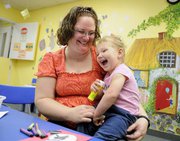Early intervention is the best prevention
Lunch programs, after-school groups and homework clubs do more than give kids full bellies, friends and better marks.
Years later, they may also keep them from committing crimes and make those children less likely to need costly special education programs.
Those conclusions are among the latest findings of a nearly 20-year-long study that has tracked hundreds of kids from disadvantaged neighbourhoods in Ontario.
The project, Better Beginnings, Better Futures, is a massive undertaking that has involved researchers from universities across the province, including three from Wilfrid Laurier University.
WLU psychology professors Geoff Nelson, Mark Pancer and Colleen Loomis hope the province takes notice of their ongoing project’s latest findings — piling more evidence onto their argument that at-risk children who participate in early prevention programs are more likely to succeed later in life.
“When we first started, we weren’t sure if this kind of approach would work. But the striking thing is we find some pretty significant impacts, not only on the children, but on their families and on whole neighbourhoods,” Pancer said.
 At the time, it was a four-year program that spanned junior kindergarten to Grade 2, and gave children things like in-school help, nutrition and behavioural programs. Their parents and neighbourhoods got to choose what was offered, hired staff, and received programs ranging from job search help, parenting and language training.
At the time, it was a four-year program that spanned junior kindergarten to Grade 2, and gave children things like in-school help, nutrition and behavioural programs. Their parents and neighbourhoods got to choose what was offered, hired staff, and received programs ranging from job search help, parenting and language training.
In the latest findings, children in three participating neighbourhoods — Cornwall, west-end Toronto and Sudbury — were compared with kids from two communities with similar economic conditions and characteristics who did not go through the program.
The result? Years later, the kids who went through the Better Beginnings programs were less likely to commit property crime, more likely to have success in school and socially, and had better-functioning families. They had fewer emotional and behavioural problems, too.
The program also saved governments money on things like special education programs, child welfare and youth court expenses, Pancer said. Later on, he expects those savings will grow, as the participating kids stay out of the welfare system and criminal careers.
At a cost of about $1,000 per child, that’s money well spent, the researchers say, considering it costs over $100,000 a year to incarcerate a person in Canada.
“It just makes economic sense,” Pancer said. “We’re already seeing significant financial savings.”
The findings come as no surprise to people who work closely with young children.
The school system, they say, has long played a large role in determining success later in life, including crime prevention. They say a struggling child who never gets help in those early years has a much greater chance of having a troubled life later on.
“The earlier you can intervene and spot the difficulties students are having, the better off they’ll be down the road. You’ll have people who are better equipped to survive in today’s world,” said John Shewchuk, chair of the Waterloo Region Crime Prevention Council and spokesperson for the local Catholic school board.
“There are many, many thousands sitting in prison right now because those kind of early intervention programs were never there for them when they needed them.”
But it’s not just schools that have a role, Pancer said. Community-based programs like those offered by the Lang’s Farm Village Association can also make the kind of differences the Better Beginnings projects illustrates.
Bill Davidson, Lang’s Farm executive director, said this kind of study is important because it proves claims long made by childhood programs — from recreational to social — that say they set kids up for better lives, he said.
He’d like to see the Better Beginnings program expanded across the province.
“It’s making the kind of difference that it should,” he said. “But I think most countries are slow to adapt to this kind of thinking. Part of the problem is we haven’t had the evidence, prior to now, to demonstrate that.”
Advocates say expanding Better Beginnings into Waterloo Region wouldn’t be that difficult. It could be added to programs already in place here to make a more comprehensive approach to early childhood prevention, said Natalie Brown, co-ordinator of the Alliance for Children and Youth of Waterloo Region.
From the Waterloo Region Record, Thursday December 2, 2010
gmercer@therecord.com
